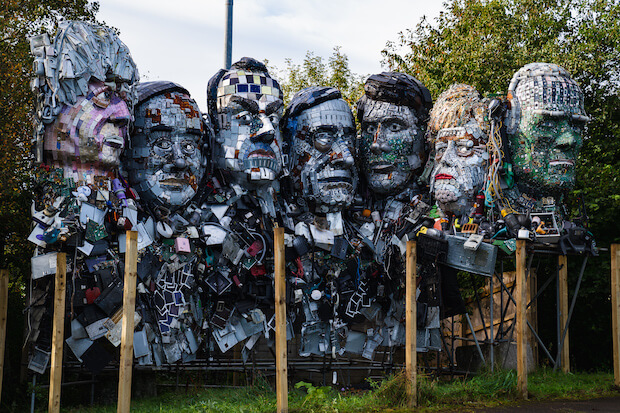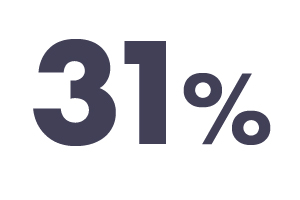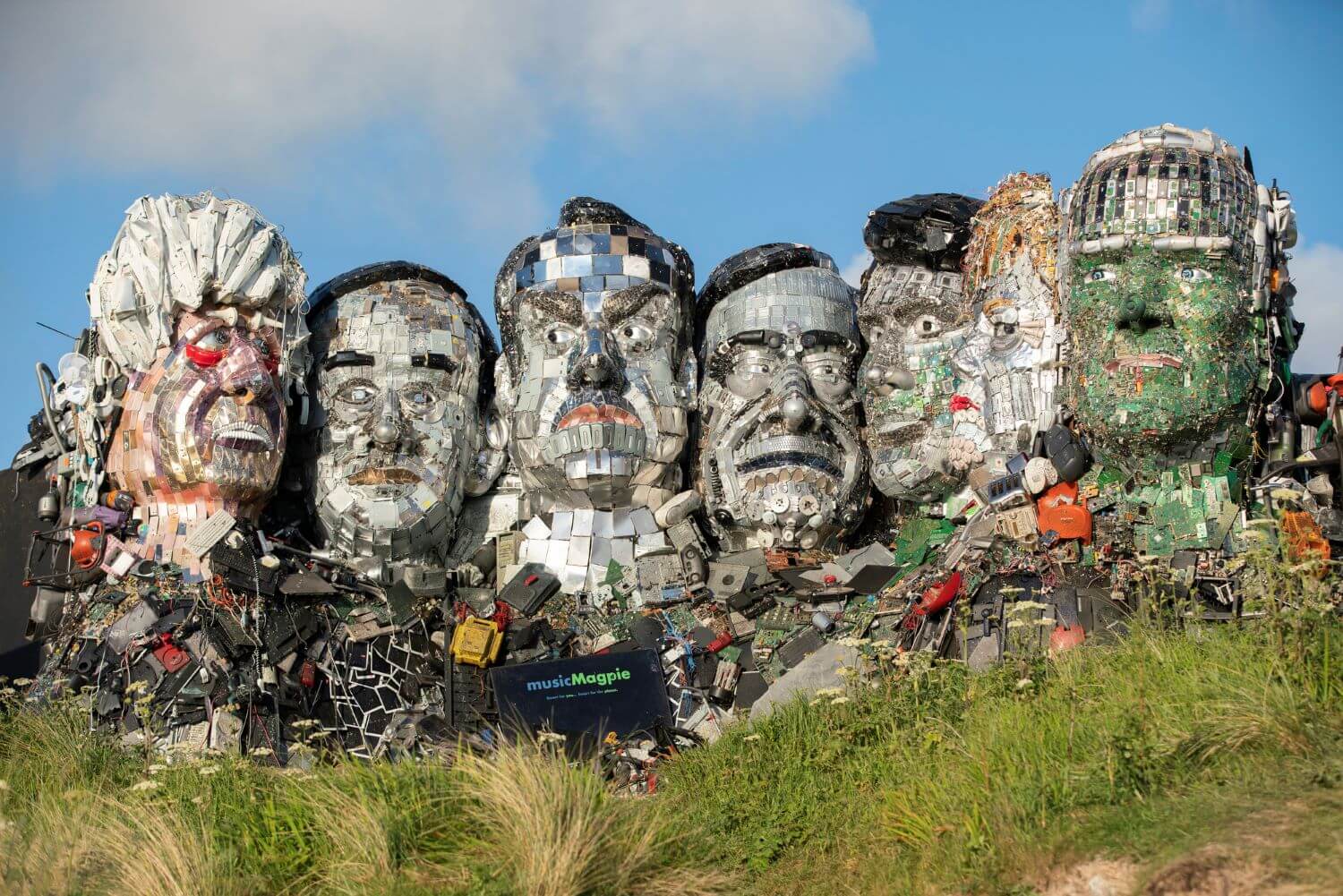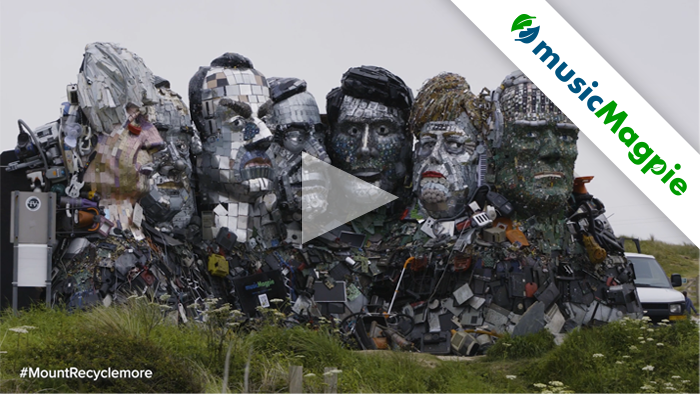The History of Mount Recyclemore
E-waste poses a huge threat to the environment - and developed nations are among the worst offenders for producing it. That’s why we decided to create a sculpture that would send a message to world leaders all around the globe. It's safe to say, it didn't go unnoticed.
What is Mount Recyclemore?
Mount Recyclemore was a giant sculpture of the G7 leaders' heads made entirely of discarded electronics and launched just in time for the G7 summit in June 2021. Its aim was to highlight the growing threat of e-waste and the importance of immediate action.
The sculpture, made from approximately 12 tonnes of discarded consumer technology, was originally located on Sandy Acres beach opposite the G7 summit in Carbis Bay, Cornwall, while the world leaders met to discuss the biggest issues facing the planet we call home.
We created Mount Recyclemore in collaboration with the Mutoid Waste Company's Joe Rush and Alex Wreckage. Joe is renowned for his environmental art installations and has collaborated with artists including Banksy, Vivienne Westwood and Damien Hirst.
Mount Recyclemore's claim to fame
We wanted Mount Recyclemore to educate and raise awareness of the growing global issue around e-waste. One thing is certain, we did exactly that!
Mount Recyclemore appeared in news outlets all around the globe, with over 1500 articles across 74 countries. As well as coverage from major news outlets, Mount Recyclemore was a huge talking point, trending on Twitter during the G7 Summit and featuring on both Jimmy Fallon’s The Tonight Show and James Corden’s The Late Late Show.
Despite being located at the G7 Summit for just four days, Mount Recyclemore gained an organic listing as a cultural landmark on Google, along with receiving its own Google Quick answers.
What happened to Mount Recyclemore?
After its unveiling opposite the G7 summit at Sandy Acres beach, Mount Recyclemore was brought to Stockport, the home of musicMagpie. For eight weeks the sculpture stayed at Stockport Exchange as part of Stockport Business Improvement District's Totally Stockport summer activities, where it was admired by the people of Greater Manchester.
The sculpture then made its way back down to Cornwall, where it was re-erected at the Eden Project to continue to educate thousands of people on the need to recycle e-waste.
Mount Recyclemore stood at the Eden Project for a year, before being dismantled, then recycled sustainably and responsibly.



What is e-waste?
E-waste is any electronic item that is nearing the end of its useful life and is discarded, donated or recycled. E-waste which isn’t recycled can end up in landfill and poses all kinds of environmental issues.
Over time, the toxic chemicals inside our tech then seep into the earth’s soil and water. The chemicals released when tech is burned pollute the air, while the refrigerants found in temperature exchange equipment are greenhouse gases.
Failing to recycle e-waste also means the precious materials contained in tech products can’t be reused. This means more primary raw materials need to be extracted and refined, which leads to an increase in greenhouse gas emissions.
The UN estimates that 53 million tonnes of e-waste are generated globally every year. It expects this figure to double by 2050, making it the fastest-growing waste stream in the world.
The G7 nations produce 15.9 million tons of e-waste each year, with the US, Japan, Germany and the UK the four worst offenders. The UK is also responsible for producing the second largest amount of e-waste per capita in the world.




How much do people know about e-waste?
Prior to Mount Recyclemore’s unveiling, we conducted some research into the UK’s e-waste knowledge. This research suggested that Brits own £16.5 billion worth of technology they no longer use, with the average household owning 11 unused devices. Despite this...




With help from Mount Recyclemore, the findings have since improved. Post campaign research commissioned in October 2021 showed that almost three-in-ten (28%) Brits knew what e-waste is, compared to one-in-five (21%) back in May 2021.
Six in ten (61%) Brits also thought e-waste contributed to climate change compared to just over half (55%) in May. And we’re proud to say, Mount Recyclemore could be recalled by 20% of UK adults.
And it doesn’t stop there, during June 2021, the campaign raised £30,000 for the global waste management charity, WasteAid, to help fund WasteAid’s sustainable e-waste management education programmes in lower-income countries
What can we do about e-waste?
At musicMagpie, we’re firm believers in a circular economy where products are resold, recycled, refurbished and reused. 95% of products we buy from our customers are refurbished and we use the parts from the remaining 5% to refurbish other items.
We can all do our bit to reduce e-waste by reselling and recycling phones and other tech products we no longer use, as well as considering buying refurbished technology instead. You can do this with musicMagpie!
The Recycle Your Electricals campaign is also calling on households to stop throwing away and hoarding their unwanted small old electricals and instead start reusing, selling, donating or recycling them.
For more information on how to recycle electricals and your nearest recycling point, please visit www.recycleyourelectricals.org.uk where you can find details of over 3,000 recycling points across the UK.
So if you have old tech at home, why not recycle it with us? We also sell refurbished phones and tech, which are an environmentally-friendly alternative to buying new.
About the Eden Project
The Eden Project is an educational charity. Its mission is to create a movement that builds relationships between people and the natural world to demonstrate the power of working together for the benefit of all living things. Eden’s home in Cornwall is a striking contemporary space for the 21st century combining botanical garden, cultural venue, park and visitor destination.
The project opened on March 17, 2001, the brainchild of Co-founder Sir Tim Smit. The team transformed a disused clay mine into a paradise. Two massive Biomes, one containing the largest rainforest in captivity and the other landscapes and crops from the world’s Mediterranean regions, act as a backdrop to stunning Outdoor Gardens. Since opening the destination has attracted more than 22 million visitors and generated more than £2.2 billion for the regional economy.




